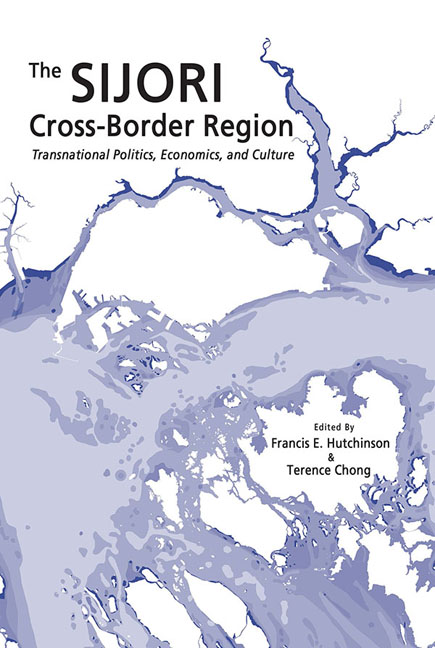Book contents
- Frontmatter
- Contents
- List of Maps
- List of Tables
- List of Figures
- Foreword
- Acknowledgements
- Contributors
- Abbreviations
- Introduction
- Section I Understanding the Whole
- Section II Policy and Politics
- Map3
- 4 The Social Construction of Comparative Advantage and the SIJORI Growth Triangle
- 5 The Political Economy of Closer Relations: A Perspective from Singapore
- 6 A Periphery Serving Three Cores: Balancing Local, National, and Cross-Border Interests in the Riau Islands
- 7 Political Contestation in Iskandar Malaysia: Views on Economic Integration during Malaysia's 13th General Election
- 8 Johor Survey: Interethnic Dissonance
- Section III Cross-Border Social and Cultural Communities
- Section IV Formal and Informal Economies
- Conclusion
- Appendix
- Sources for the SIJORI Maps
- Index
4 - The Social Construction of Comparative Advantage and the SIJORI Growth Triangle
from Section II - Policy and Politics
Published online by Cambridge University Press: 22 July 2017
- Frontmatter
- Contents
- List of Maps
- List of Tables
- List of Figures
- Foreword
- Acknowledgements
- Contributors
- Abbreviations
- Introduction
- Section I Understanding the Whole
- Section II Policy and Politics
- Map3
- 4 The Social Construction of Comparative Advantage and the SIJORI Growth Triangle
- 5 The Political Economy of Closer Relations: A Perspective from Singapore
- 6 A Periphery Serving Three Cores: Balancing Local, National, and Cross-Border Interests in the Riau Islands
- 7 Political Contestation in Iskandar Malaysia: Views on Economic Integration during Malaysia's 13th General Election
- 8 Johor Survey: Interethnic Dissonance
- Section III Cross-Border Social and Cultural Communities
- Section IV Formal and Informal Economies
- Conclusion
- Appendix
- Sources for the SIJORI Maps
- Index
Summary
INTRODUCTION
The late 1980s witnessed efforts to establish a single economic space across Singapore, Johor in Malaysia, and Batam, Bintan, Karium as well as other islands in the Riau Archipelago in Indonesia. As a regional expression of new forms of economic cooperation arrangements — a departure from traditional textbook models of free trade areas, custom unions, common markets, and economic unions — the Singapore-Johor-Riau Growth Triangle (henceforth, SIJORI) was, at that time, promoted by the Singapore government as “the concept of borderless economic zones with coherent and integrated divisions of labour that transcend formal national political boundaries” (quoted in Rodan 1993, p. 223).
To be sure, growth triangles represent a very particular genre of market creation. The usage of such cross-border regionalism as an embodiment of both borderless free trade and of city-region development is particularly evident in East and Southeast Asia. The Chinese Economic Area which links Southern China (Guangdong and Fujian provinces), Hong Kong and Taiwan — generally known as the South China Growth Triangle — provides one of the earliest examples, but its status as a formal cross-border region became blurred with Hong Kong and Macau's subsequent incorporation as Special Administrative Regions of China (Breitung 2002; Yamazawa 2013). The Indonesia-Malaysia-Thailand Growth Triangle (IMT-GT) and the Brunei-Indonesia-Malaysia-Philippines East ASEAN Growth Area (BIMP-EAGA) constitute other platforms in Southeast Asia but these are arguably less commercially operational. Instead, SIJORI was held as the most widely cited example of an ideal “borderless” regional market space.
However, there is a vast body of literature that has argued that the deterritorialized character of our global age does not imply that we are living in the sort of borderless world suggested by the likes of Ohmae (1995) and Mahbubani (2013) or envisaged by free trade enthusiasts. Overstating the statist approach has also resulted in a mystification of the role of the state in the formation and reproduction of capitalist social relations in market institutions (Chang 2013). In effect, the borderless rhetoric of the complementarity conjoining Singapore capital with Johor and Riau not only legitimizes the political support for the Growth Triangle, it also obscures and understates the conditions and mechanisms in not only reproducing the model, but also the consequences resulting from its reproduction.
- Type
- Chapter
- Information
- The SIJORI Cross-Border RegionTransnational Politics, Economics, and Culture, pp. 105 - 124Publisher: ISEAS–Yusof Ishak InstitutePrint publication year: 2016



